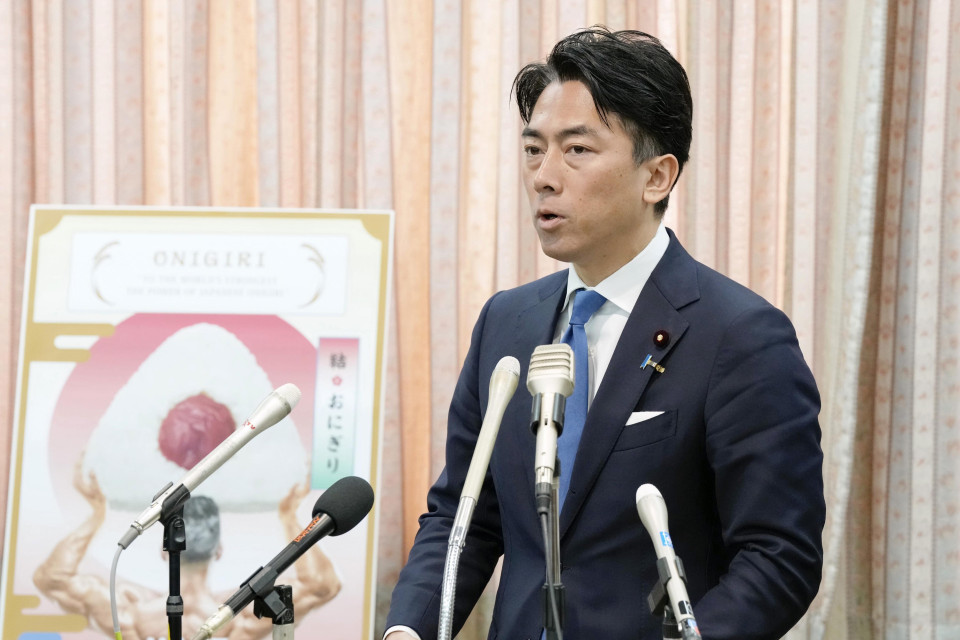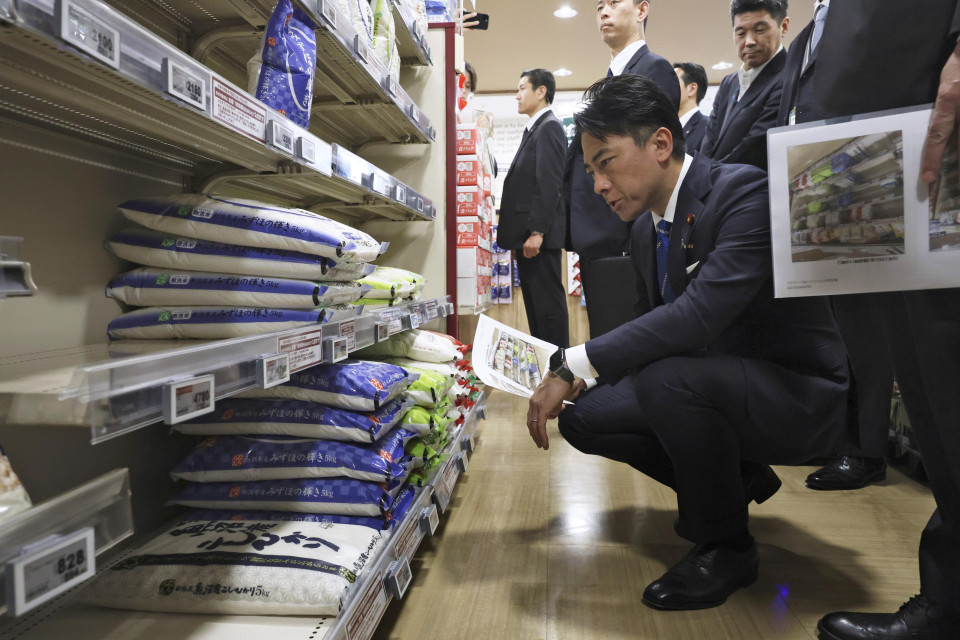Japan began selling government rice stockpiles through direct contracts on Monday after the newly appointed farm minister pledged to curb soaring prices of the nation’s staple by selling the stockpiles at less than half the average price.

New farm minister Shinjiro Koizumi announces a new system for releasing government rice stockpiles to bring down soaring prices, at the Ministry of Agriculture, Forestry and Fisheries in Tokyo on May 26, 2025. (Kyodo) ==Kyodo
Targeting a level of around 2,000 yen ($14) per 5 kilograms by early June, rice produced in 2021 and 2022 is slated for release through contracts with major retailers, such as supermarkets.
The move comes as the government tries to counter criticism that it has failed to prevent rice prices from soaring amid inflation outpacing wage growth and straining household budgets.
The plan to release 300,000 tons of rice bypasses the auction system, under which farming cooperatives purchased most of the previously released stock, limiting the government’s ability to influence prices.
The rice, harvested a few years ago, will be sold at an average pretax price of 10,700 yen per 60 kilograms, with the government covering transportation costs to regional areas. Online sales are also being considered to widen distribution.
“Had we continued as we were, I did not believe we could fulfill people’s expectations,” farm minister Shinjiro Koizumi told Ministry of Agriculture, Forestry and Fisheries officials in a meeting, which was open to the press.
“We will move at speed and with urgency to dispel the people’s concerns,” he said.
On the same day, the agriculture ministry established a special response team of some 500 members nationwide tasked with handling high rice price issues. Koizumi said the group must prevent a situation where the public starts to turn away from rice products.
Large retailers handling 10,000 tons or more rice will receive such contracts.
The new measures also do not require retailers to comply with previous requirements that suppliers who bought auctioned rice would have to return an equivalent amount to the government.
Under the previous system, the government from March began auctioning some 312,000 tons of rice stockpiles in three tranches. They were sold mainly to groups such as the Japan Agricultural Cooperatives.
In suspending the approach, Koizumi has said the highest-bidder-wins auction system was pushing up rice costs.
The average price of the staple food at supermarkets has risen almost continuously in recent months, hitting a record 4,285 yen per 5 kg in mid-May, roughly double last year’s level, due partly to a poor harvest and delays in releasing stockpiled rice.
Regarding contracts, Seven & i Holdings Co. said Monday that its Ito-Yokado supermarket chain will enter into a negotiated agreement, while rival Aeon Co. said it is considering joining the deal.
Japanese tech giant LY Corp., operator of the Line messaging app, said it is considering selling the rice online, while Rakuten Group Inc. is moving quickly to enter the market in partnership with Japan Post Co.
Koizumi assumed his post on Wednesday after his predecessor resigned in an uproar over a gaffe in which he said he had never bought rice due to having a surplus that had been gifted by supporters.
The public appears receptive to Koizumi’s plans, with a Kyodo News poll released Sunday after he joined Prime Minister Shigeru Ishiba’s Cabinet showing 59.8 percent of respondents think he can bring down rice prices.

Japan’s new Agriculture, Forestry and Fisheries Minister Shinjiro Koizumi visits the rice section at a supermarket in Tokyo on May 23, 2025, amid rice shortages and surging prices. (Pool photo) (Kyodo) ==Kyodo
Related coverage:
Nearly 60% expect rice prices to fall with new farm minister: poll
New farm minister eyes 2,000 yen per 5 kg retail price for gov’t rice
FOCUS: Free rice gaffe sends Ishiba into pre-election damage control mode